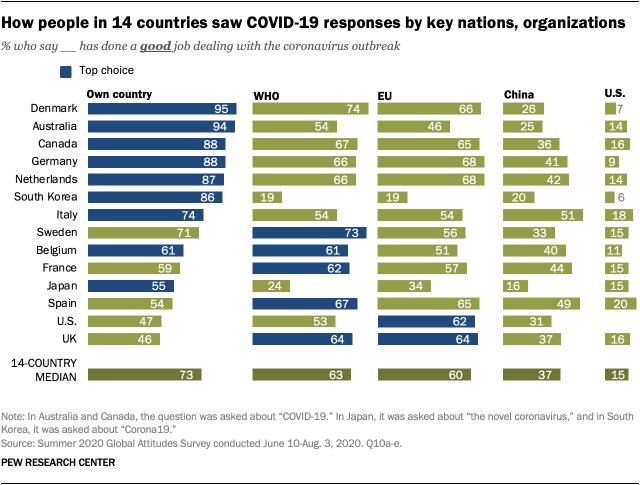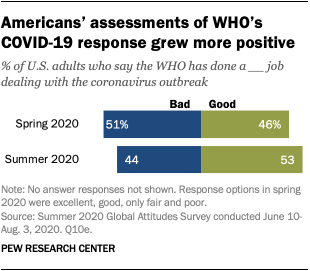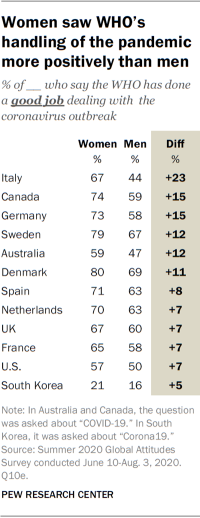
The World Health Organization (WHO) has played a controversial role in the global response to the coronavirus pandemic. U.S. President Donald Trump has accused the organization of being too close to China and moved to withdraw the United States from it. At the same time, the WHO is helping coordinate the international rollout of potential vaccines and treatments for COVID-19.
As the WHO holds its 73rd World Health Assembly – remotely this year, due to the pandemic – here is a look at how people in 14 advanced economies viewed the organization’s initial COVID-19 response, based on surveys conducted in June through August by Pew Research Center.
This analysis focuses on how people in 14 advanced economies viewed the World Health Organization’s response to the coronavirus outbreak earlier this year.
The analysis is based on nationally representative surveys of 14,276 adults conducted from June 10 to Aug. 3, 2020. (It’s important to note that this was a time when the pandemic appeared to be receding across Europe and much of the U.S.) Surveys were conducted over the phone with adults in the U.S., Canada, Belgium, Denmark, France, Germany, Italy, the Netherlands, Spain, Sweden, the UK, Australia, Japan and South Korea. Here are the questions used for this report, along with responses, and its methodology.
The study was conducted in countries where nationally representative telephone surveys are feasible. Due to the coronavirus outbreak, face-to-face interviewing is not currently possible in many parts of the world.
In most surveyed countries, majorities approved of the WHO’s handling of the pandemic, though there were some notable exceptions. A median of 63% of adults across 14 nations said this summer that the WHO had done a good job dealing with the coronavirus outbreak. In 12 of these countries, half or more thought the WHO had managed the pandemic well.
Japan and South Korea – two early hotspots for the virus – were notable outliers. Only about a fifth of South Koreans (19%) and a quarter of Japanese (24%) were convinced the WHO had dealt with the pandemic well. In May, South Korean President Moon Jae-In pushed for the organization to be tougher on member nations, particularly with regard to sharing data about the virus. And Japanese Deputy Prime Minister Taro Aso has panned the organization for its close ties to China, a nation viewed negatively by nearly nine-in-ten Japanese.
People in most surveyed countries were more likely to approve of their own nation’s handling of the pandemic than the WHO’s response. But that wasn’t the case everywhere. In Sweden, Belgium, France and the U.S., similar shares said their country and the WHO had done a good job. Elsewhere, more said the WHO had handled the outbreak well than said the same of their own country. (The survey was conducted in summer, before a second surge in coronavirus cases began across Europe.) In the UK, fewer than half (46%) said their own country had done a good job dealing with the virus, but 64% said the same about the WHO. Similarly, in Spain, 54% said their country had dealt with the virus well, but two-thirds said the same of the WHO.
Americans have grown slightly more positive about the WHO’s handling of the pandemic. Only 53% of Americans said this summer that the organization had handled the outbreak well, but that represented an increase since the spring, when only 46% said this.
Democrats and independents who lean Democratic were more likely than Republicans and Republican leaners to assess the WHO’s pandemic response positively. Seven-in-ten Democrats said the organization had done a good job dealing with the outbreak, compared with only 32% of Republicans. There was a similar partisan divide in the spring, but the share of Democrats who rated the WHO’s response positively increased by 8 percentage points by summer (from 62% to 70%).
In all surveyed nations, those who have a favorable opinion of the United Nations were more likely to think the WHO – which is part of the UN – had done a good job dealing with the virus. In Australia, for example, 69% of adults with a favorable view of the UN saw the WHO’s handling of the pandemic as effective, compared with only 26% of those with an unfavorable opinion of the UN.
In some countries, including the U.S., political ideology and support for political parties were also connected with views of the WHO. In half the countries surveyed, those on the left of the ideological spectrum were more likely than those on the right to think the WHO had handled the pandemic well.
Similarly, Europeans who support left-wing populist parties were more likely to think the WHO had done a good job managing the outbreak when compared with those who do not support these parties. Conversely, supporters of some right-wing populist parties were less likely than nonsupporters to think the organization’s response to the coronavirus outbreak had been effective.
In most surveyed countries, women and younger adults were more likely to say the WHO had handled the virus well. The gender divide was largest in Italy, where two-thirds of women said this summer that the organization had been effective in dealing with the pandemic, compared with fewer than half of men (44%).
Similarly, in nine countries, adults ages 18 to 29 were more likely than those 50 and older to say the WHO had done a good job dealing with the outbreak. For example, in the U.S., 68% of younger adults said the WHO’s response to the outbreak had been effective, compared with only 49% of older adults.
Note: Here are the questions used for this report, along with responses, and its methodology.



